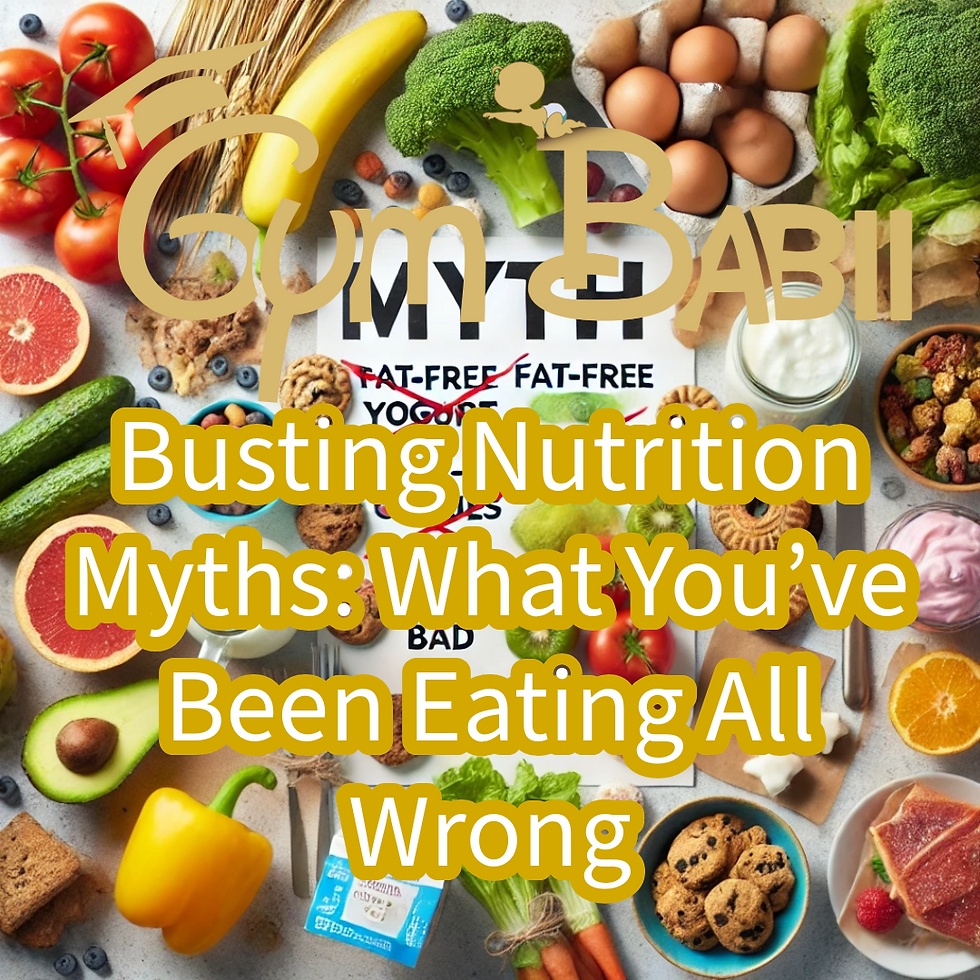Busting Nutrition Myths: What You’ve Been Eating All Wrong
- Gym Babii Writing Team

- Oct 21, 2024
- 4 min read
Updated: Apr 7

When it comes to nutrition, there’s no shortage of advice out there. Unfortunately, much of it is based on myths that can confuse and mislead even the most health-conscious individuals. Today, we’re setting the record straight by busting some of the most common nutrition myths that might be sabotaging your journey to a healthier lifestyle.
Myth #1: Carbs Make You Fat
Carbs have gotten a bad rap in recent years, with popular diets like keto and paleo pushing the idea that carbohydrates are the enemy of weight loss. But here’s the truth: carbs don’t inherently make you fat.
Carbohydrates are your body’s primary source of energy. Whole grains, fruits, and vegetables are all rich in healthy carbohydrates that provide essential nutrients like fiber, vitamins, and minerals.
The real issue: Highly processed carbs, like white bread, pastries, and sugary cereals, can lead to weight gain when eaten in excess because they lack fiber and cause blood sugar spikes. Instead of cutting out carbs entirely, focus on consuming whole, unprocessed sources of carbohydrates that fuel your body properly.
Myth #2: Fat-Free Means Healthy
“Fat-free” products have been marketed as the healthier option for decades, but this is one of the most misleading claims in the nutrition world. Many fat-free products compensate for the lack of flavor by adding sugar, artificial ingredients, or unhealthy fillers.
Fat is not your enemy. In fact, healthy fats found in foods like avocados, nuts, seeds, and olive oil are essential for brain function, hormone regulation, and nutrient absorption.
The takeaway: Don’t be fooled by fat-free labels. Read the ingredients, and choose healthy fats over processed, fat-free products loaded with sugar and additives.
Myth #3: Sugar-Free Is Better
Similar to the fat-free myth, “sugar-free” products can be a nutritional trap. Many sugar-free foods contain artificial sweeteners, which can actually lead to increased cravings for sweets, disrupt your gut microbiome, and negatively affect your metabolism.
Instead of relying on artificial sweeteners, try to reduce your overall sugar intake. Choose naturally sweet foods like fruits, and sweeten your foods with small amounts of honey or maple syrup when necessary.
The truth: Just because something is sugar-free doesn’t mean it’s healthy. Be mindful of ingredient lists and opt for whole, unprocessed foods whenever possible.
Myth #4: You Need to Eat Small Meals Throughout the Day to Lose Weight
For years, we’ve been told that eating multiple small meals throughout the day boosts metabolism and helps with weight loss. While this approach might work for some people, there’s no evidence that eating more frequently has any significant effect on metabolism.
The key to weight loss is creating a calorie deficit—burning more calories than you consume. Whether you eat three large meals or six small ones doesn’t matter as long as your total daily caloric intake aligns with your goals.
What matters: Focus on eating balanced meals that satisfy your hunger and keep your energy levels stable, rather than forcing yourself to eat small meals every few hours.
Myth #5: You Should Avoid All Snacks to Lose Weight
Snacking isn’t the enemy, but mindless snacking on unhealthy, calorie-dense foods can be. In fact, healthy snacks like nuts, fruits, or yogurt can keep your energy up and prevent overeating at meals.
Healthy snacking tip: Choose nutrient-dense snacks that are high in protein, fiber, and healthy fats to keep you full and satisfied without packing on extra calories.
Myth #6: Juice Cleanses Detox Your Body
Juice cleanses have become a popular trend, with claims that they detoxify the body and help you lose weight quickly. However, your body already has its own detox system—your liver, kidneys, and digestive system do the job of removing toxins quite well.
Juice cleanses can be very low in protein, fiber, and healthy fats, leading to muscle loss, fatigue, and even blood sugar imbalances. Instead of relying on extreme cleanses, focus on a balanced diet rich in whole foods, and drink plenty of water to support your body’s natural detox processes.
The verdict: Skip the juice cleanse and stick to a well-rounded diet that supports your body’s health every day.
Myth #7: All Calories Are Equal
While it’s true that a calorie is a unit of energy, not all calories are created equal when it comes to your body’s nutrition and energy needs. A 100-calorie pack of cookies is not the same as 100 calories of almonds.
Whole foods provide more than just calories—they offer essential nutrients, vitamins, fiber, and healthy fats. Processed foods, on the other hand, can be calorie-dense but low in nutrition, leading to poor health outcomes over time.
Focus on quality: Aim for nutrient-dense foods that provide the vitamins and minerals your body needs to thrive, rather than focusing solely on calorie count.
Final Thoughts: Build Your Nutrition on Facts, Not Myths
When it comes to nutrition, it’s easy to get caught up in the latest trends and diet fads. But the key to long-term health and wellness is building your diet on evidence-based facts, not myths. Focus on whole, unprocessed foods, and listen to your body’s needs rather than following strict rules or misleading labels.
Stay connected, keep growing and learning, and remember: You’re not just improving your present—you’re safeguarding your future. For more tips, challenges, and hacks, check out the Gym Babii Central Intelligence Hub at www.gymbabii.com.
Over and Out, The Gym Babii Team





Comments